
The premiere of the unusual mini-opera "Viva, Mozart!" took place on November 19, on a snowy Thursday, in the Music Room of the Bolshoi Theater. The mini-opera was enjoyed by all those who suffered from the pandemic impacts, which separated many close people from each other during the long period of lockdown. The performance helped to forget about all the human misfortunes and enjoy the divine life-affirming music of Mozart.
This season, despite all the difficulties associated with the pandemic, the activity of the Small Stage of the theater – the Musical Lounge-has become active and diverse. The Tashkent audience, to everyone's joy, warmly welcomed several evenings that reveal the creative possibilities of both our experienced soloists and young opera soloists and trainees. The small stage is gradually becoming a kind of creative laboratory for experiments and education of new generations of opera singers.
The works of the great Austrian composer Wolfgang Amadeus Mozart triumphantly march through the opera stages of the world, delighting the audience with brilliant performances and interesting interpretations. The State acadmic theater named after A. Navoi has already staged such wonderful Mozart operas as "The Magic Flute" and "The Wedding of Figaro"in its stage history. But, like all performances, they had their own life span and eventually were removed from the repertoire. But the staff members and administration of the theater always had a desire to embody Mozart's operas.
Wolfgang Amadeus Mozart (1756-1791) was a great Austrian composer and conductor. The representative of the Vienna Classical School of Music, the author of more than 600 musical works, he became famous across the globe for more than one century in the short 35 years of his fruitful life. A great composer, a life-loving optimist – and the deepest philosopher, a master of irony and humor – and one of the few chosen ones who was given the opportunity to approach the most mysterious facets of existence. A filigree, subtle and profound master of the opera genre, a stunning symphonist, a carter of dynamic and refined musical drama - Mozart boldly passed through all the facets of almost two and a half centuries and turned out to be not only our contemporary, but also far ahead of our time and our philistine lifestyle with a special aspiration to the most important categories of life – selfless love for his family, his wife Constanza, the world as a whole and musical creativity.
Yes, Mozart firmly believed that achieving harmony and happiness is impossible without trials of feelings, attitudes to life – and becoming better and complete, be worthy of his special harmony of spirit, individual for everyone. Mozart knows how to smile ironically, and laugh sarcastically – and plunge into the depths of the greatest human dramas and tragedies.
The author of the composition, director, Honored Artist of Uzbekistan Andrey Slonim managed to demonstrate all the peculiarities of human character in one musical performance in a very unusual and bold way. The State academic theater’s orchestra was led by a young conductor Suhrob Rajabov. This evening, the Maestro, like Mozart, conducted the orchestra in a white wig and a ceremonial "Mozart" tailcoat and resembled his great predecessor not only with a gallant appearance, but also with a virtuoso mastery of the orchestra. Choreographer, Honored Artist of Uzbekistan Amina Babajanova, concertmaster Lyudmila Slonim and the entire performing staff of the best opera soloists of the theater-each of them made their contribution to the world of Mozart's images so that they came to life again in all their splendor on the Small Stage.
The performance turned out to be fast, compact (with a total duration of one hour and fifteen minutes!). In the two sections of the opera performed without interruption, he revealed many images of the great composer and the variously enlightened essence of his work.
The first of them is a one-act singspiel-buff (a comedy performance that combines both vocal and stage numbers and witty dialogues of the characters) "The Director of the Theater". In it, the combination of vocal numbers with dynamic dialogues is one of the most difficult tasks for opera soloists. And many of them discover new and unexpected performing traits and properties in this performance. This work of Mozart is performed quite rarely, although the sound of his theme seems to be extremely modern.
The opera tells about the adventures of the two theatrical artists – One being the director of the opera, Mr. Frank (Hislat Kamilov charmingly and succinctly played this role with frank humor, not afraid to look funny and a little naive) and the other his assistant – the comedic actor Buff (artistic and charismatic, like Khlestakov in "The Inspector", Zhasur Saidov was on top, playing a bluffing swindler) – decided to create a theater troupe of artists with the cheapest fees. The heroes of the performance begin this with an aim of solving their financial problems.
There is another very bright comic role in the opera - the banker Euler (in a very bright performance by Rishat Reshitov), who is in love with the prima donna Madame Hertz, but because of her passion to sing and play tragedies-deprived... her reciprocal feeling. The banker believes that Madame Hertz should sing and act on stage, and ... to love him. And he begs Frank to enroll his favorite in the troupe, paying any of her fees, so that only the only prima would shine on the stage - Madame Hertz. And Rishat Reshitov leads the conversational role of his hero with special acuteness (he will successfully recreate the vocal images in the second part of the play!) with the necessary level of humorous expressiveness and plastic sharpness, which puts this image among the brightest. However, there are practically no minor roles in this performance!
From the first moments of this thirty-five-minute performance, we are immersed in the grotesque sharpness of situations in which two rival prima donna singers try to assert the right of each to be "the first and only". Thus, in the opera "The Director of the Theater", not only the vocal, but also the stage duet of Madame Hertz, the prima donna (Angelika Mukhametzyanova) and Mademoiselle Silberklang, the prima donna (Elena Shaverdova) is full of sarcasm and conceit of two irreconcilable rivals for the title of gala singer in a provincial theater.
It should be noted here that both Mukhametzyanova and Shaverdova- are two great lyric and coloratura soloists of the theater, who brilliantly performed the roles of Lucia, Musetta and many other most serious tragic roles of opera heroines-appear in this performance in a completely unexpected guise. The creativity and mischief level of the both the executive director and the artists is truly inexhaustible. Two "prima donnas", each of whom claims unlimited" premiership and priority exchange biting "pleasantries", then with purely "ladies" ferocity fence with swords. This looks very much like a "Japanese" fight with a broom and a baton. The "Tragedy" prima donna Madame Hertz, performed by Angelika Mukhametzyanova, is literally obsessed with the idea of playing roles with super-passions and suicide in the finale, she furiously brandishes an ultra-fake dagger and, of course, "kills" herself at the end of the most difficult coloratura aria, in order to jump up and demand an ovation in a second. She literally boos (with the help of a sports whistle!) the vocal rondo of her rival. And these charming staging and acting finds are truly innumerable!
In other hand, Elena Shaverdova embodies her Silberklang as a completely different, but no less bad-tempered lady, ironically mocking all the attempts of her "rival" to assert her primacy and uniqueness. Her vocal part is also incredibly complex technically, and life on stage is full of eccentricity. And this saturation of the most complex vocal technique with paradoxical sarcastic touches, combined with the intonational richness and skill of biting dialogues and special comical plasticity, gives us images both sharp – featured and extremely funny in the performance of these talented soloists.
The unlucky tenor hero, Mr. Vogelsang (Bekzod Sadykov), is also hired to the same troupe, confident that it is the tenor who is the main person in the opera! The young singer Bekzod Sadykov, who recently performed the role of Turiddu in "Rural Honor" with dramatic persuasiveness, and just the other day surprised with a special drama and sincerity in the romances of P. I. Tchaikovsky – here, to everyone's amazement, created a convincing and unusually pointed image of the "darling tenor", intoxicated with both his voice and his meaning on the opera stage. There are also two more young singers in the play, literally chasing the director Frank with insistent request to assess their talent and accept them into the troupe (Galina Golubkova and Valeria Sharovatova). These characters doing their best to "work with their elbows", clearing a place for themselves in the theater being created, and dreaming of becoming "the first and only"! And the banker, Mr. Euler, having come to terms with the loss of Madame Hertz, is quite comforted by the attention of new young singers and thus ready to pay all the fees and theater expenses.
Of course, the author has somewhat exaggerated the colors – but all these same features are quite relevant for many current theater companies. The play reveals this sharpness, bringing the characters to literally "peak" situations that expose vanity and self-praise – familiar properties that can negate the great unity of forces and talents in the theater... But it is precisely in this unity, with the combination of different talents, temperaments, individual the theaters exist. Of course, the great performance of the Mozart is a witty and mischievous joke, but in this joke there is an aspiration to ensure that creativity is real, talent is genuine, and hard work and unity of creativity is fruitful...
Finally, all the characters of the opera "The Director of the Theater" realize this truth. And in the second part of the performance, they are happy to embody scenes and arias from Mozart's wonderful operas – "The Wedding of Figaro", "The Magic Flute", "Don Juan" and others in a theatrical form. And the light of Mozart's energy somehow helps to embody a variety of characters, situations, positions.
Once again, the great theater manages to bring its main benefit with the help of paradoxical comic situations,. By the will of the director Andrey Slonim, the images of the heroes of Mozart's operas are embodied... the heroes of the "Theater Director" themselves are the singers recruited into the troupe by Mr. Frank, including himself and even... the banker Euler, who also decided to sing on the opera stage. They retain both their appearance and costumes, changing only the elements of their attire. And due to the excellent vocal and acting skills of all the participants of the performance, this transformation takes place in front of the audience in an interesting, harmonic and bright way.
In the second part of the performance, Angelika Mukhametzyanova demonstrated her unique talent (she performed the ultra-complex Aria of the Queen of the Night ("The Magic Flute"). The opera "The Wedding of Figaro" has been brilliantly performed. The outstanding duet of Susanna and Figaro, as well as Arioso Figaro( Hislat Kamilov – Figaro, Susanna - Gulmira Nurmetova); the scene of Susanna and Marcelina (Valeria Sharovatova) have been also played. This galaxy of talents was supplemented and blossomed by Zhasur Saidov (Aria of Graf Almaviva); Rishat Reshitov (the most popular Aria of Figaro); The duet of Don Juan (Hislat Kamilov) and Zerlina (Gulmira Nurmetova) - from the opera "Don Juan". Each and every artists participating in this opera was bright vocally, organic on stage and of course truly theatrical! In general, this kind of performance can rightfully be considered as a symbol of true art. Bright, eccentric costumes, expressive makeup complemented this multicolored palette and brought conviviality and joy to the performance.
In the final, all the participants of the performance performed the coda of the opera "The Wedding of Figaro" (the meaning of which is: "The glory of life -stormy, noisy! Joy, live forever in us! Glory to the witty joke! Glory to passion and love!), causing a standing ovation of the audience.
The story brought by the performance will help both the performers and the audience to become spiritually richer and life and love are truly great gifts that must be protected and preserved.
Without doubt, the success of the performance is a result of a huge, scrupulous work on singing and drama, on the plasticity and sharpened expressiveness of the executive-director Andrey Slonim, the conductor of the orchestra Suhrob Radzhabov and the concertmaster Lyudmila Slonim. There are no direct dances in the performance, but the choreographer Amina Babajanova subtly colored the plastic of the characters with almost dancing grace and etiquette accuracy – and all this is shaded with grace and humor.
The leading soloist of the State academic theater, Yanika Bagryanskaya, shared her impressions after the performance under the untiring roar of applause. She noted that Mozart was performed for the first time in the walls of the Bolshoi Theater after a long break. The author, the concertmaster, the orchestra and all the participants of the new project, young and honored artists, gave their best in full: in the shortest possible time. Such an enchanting result was achieved through numerous rehearsals and fruitful work. In her opinion, this is a very useful repertoire that helps soloists to realize his/her full potential – to set the voice and be in the best shape. The audience reacted very warmly to the performance of each artist, and this is always pleasant. May God will that Mozart performances will be staged in our theater more than once, to the delight everyone-artists and spectators!
Yanika Bagrianskaya also shared with her future plans. In December, the opera by the French composer Charles Gounod "Faust" will be performed in a concert performance, in which the artist will embody one of the main roles – Siebel, a young man in love with Margarita, on the main stage of the Bolshoi Theater.
Based on the requests of the audience – both those who was present at the premiere, and those who have missed "Viva, Mozart!" for some reason - the second premiere will take place on November 29 at 14.00 on the Small Stage of the State academic theater. As stated by the executive director A. Slonim the performance will take place in the repertoire of the theater in an even more "expanded" and improved form. A new beautiful and unusual performance of the theater can be surely considered as an important event in the theatrical life of Uzbekistan, which confidently and boldly begins its stage life, waiting for a grateful audience...
Guarik Bagdasarova
Photo credits: Yuri Polyansky
3 декабря 2020
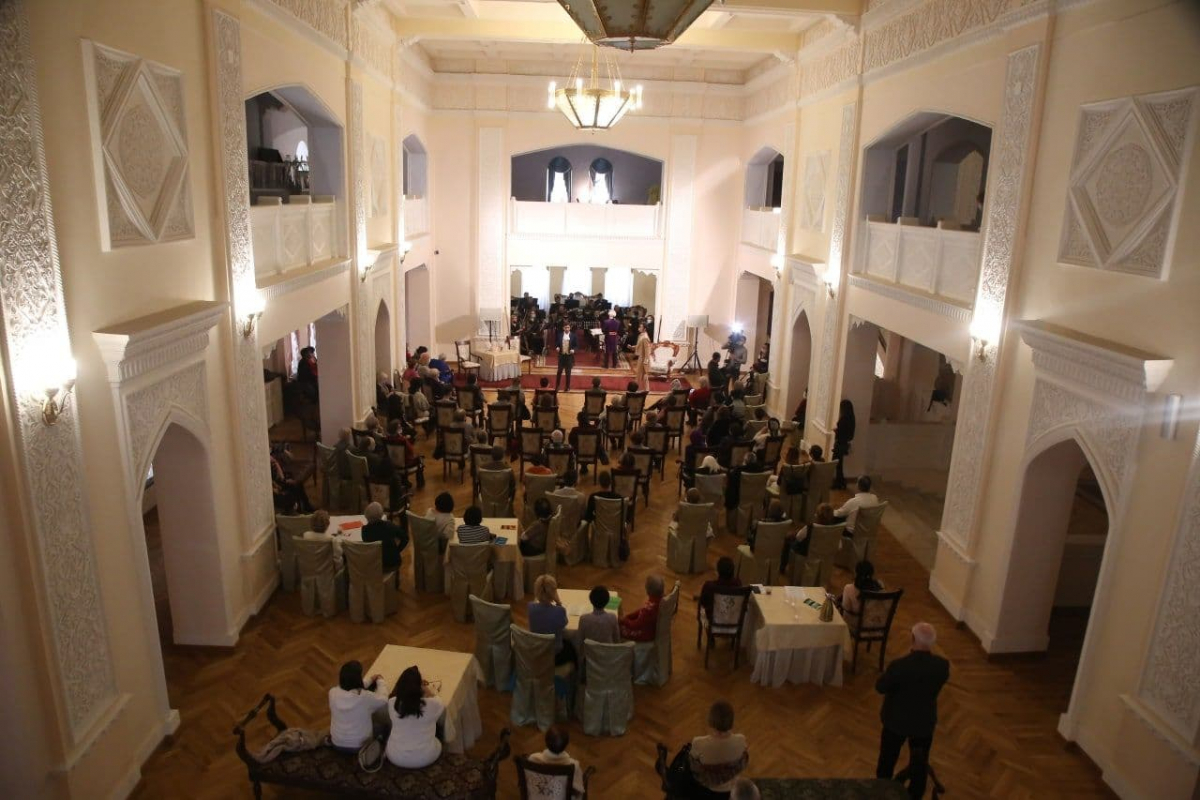
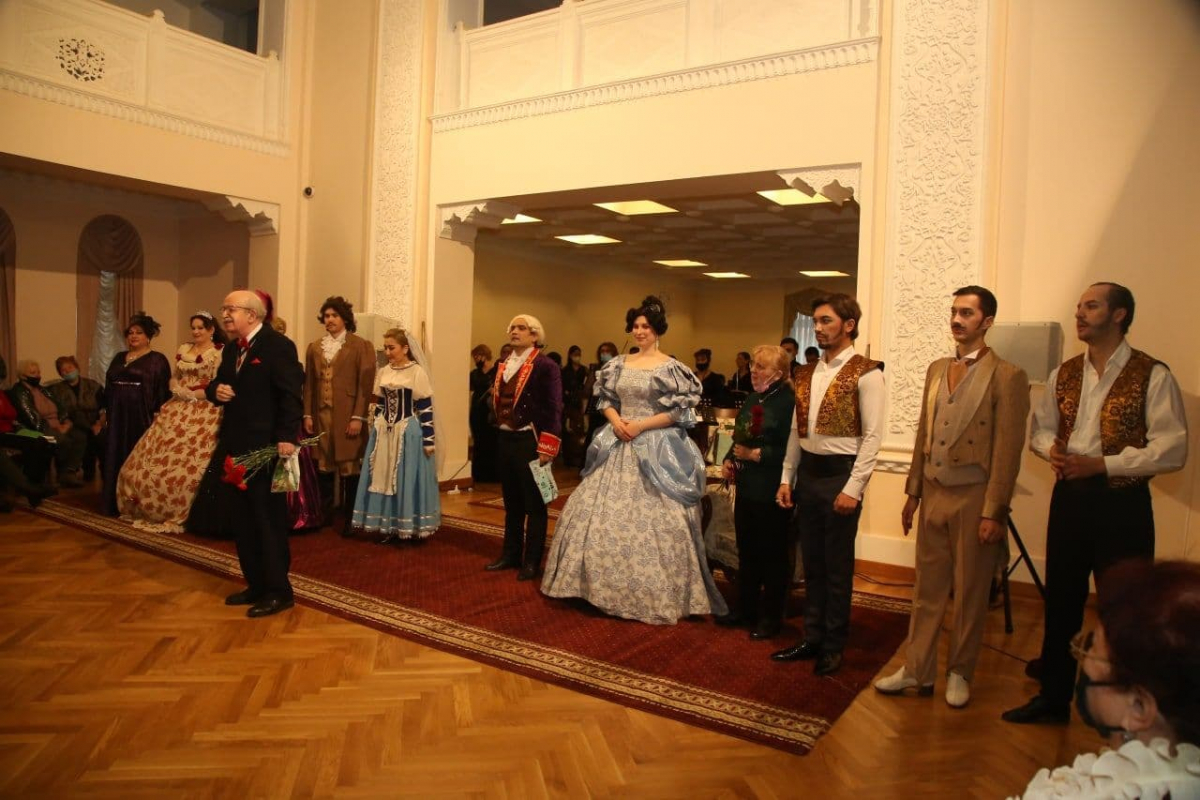
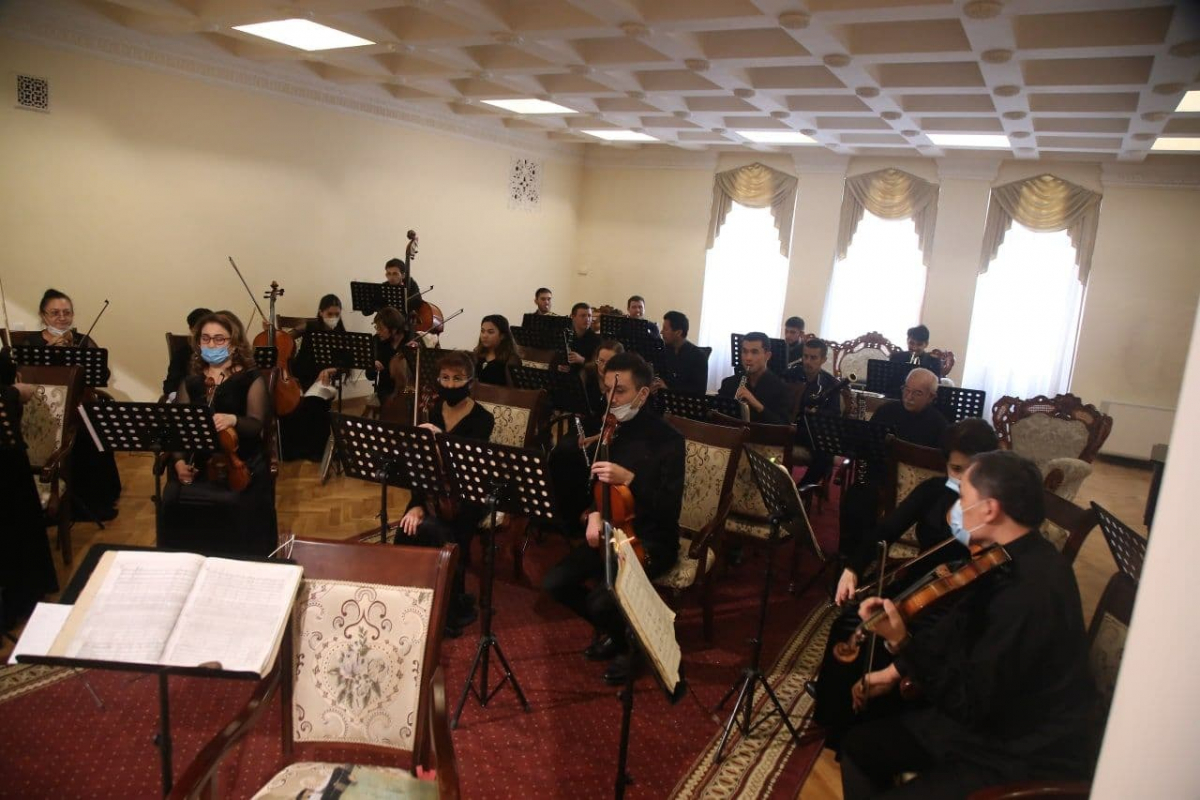
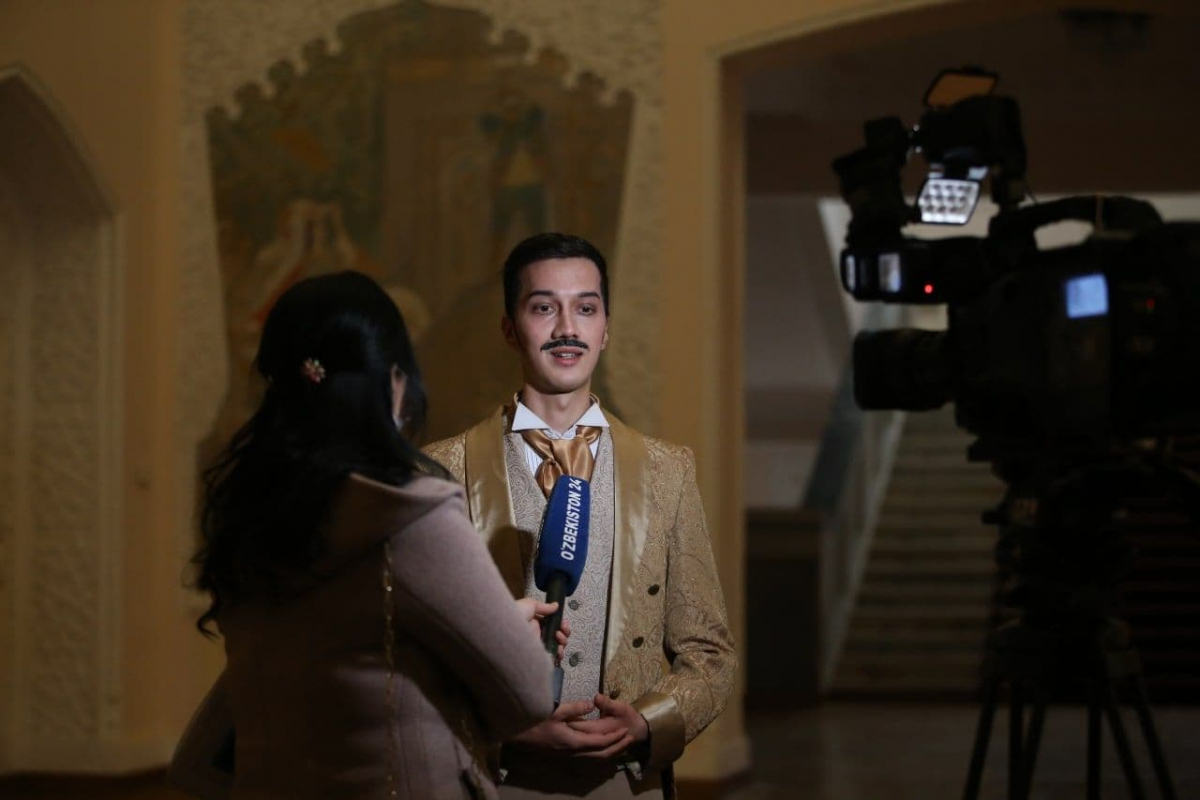
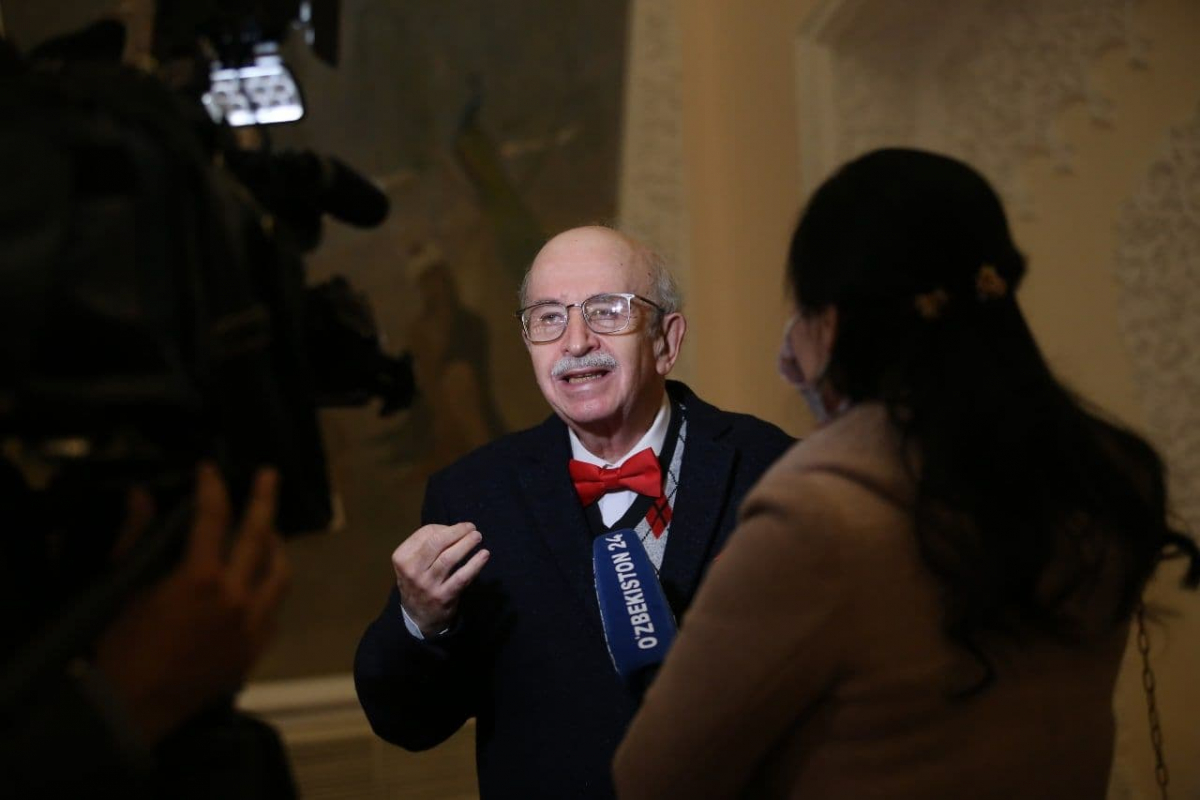
Ticket office: (+99871) 232-19-48
Administrator: (+99871) 233-33-36
Deputy Director for the audience: (+99871) 233-32-21
Theater address: Zip code 100029. 28, Zarafshon str., Tashkent, Uzbekistan
Phone / fax: (+99871) 233-35-28, E-mail: info@gabt.uz, gabtuzb@mail.ru
Facebook: https://www.facebook.com/gabtnavoi/
Telegram: https://t.me/gabtuzb
Instagram: https://instagram.com/gabt.uz